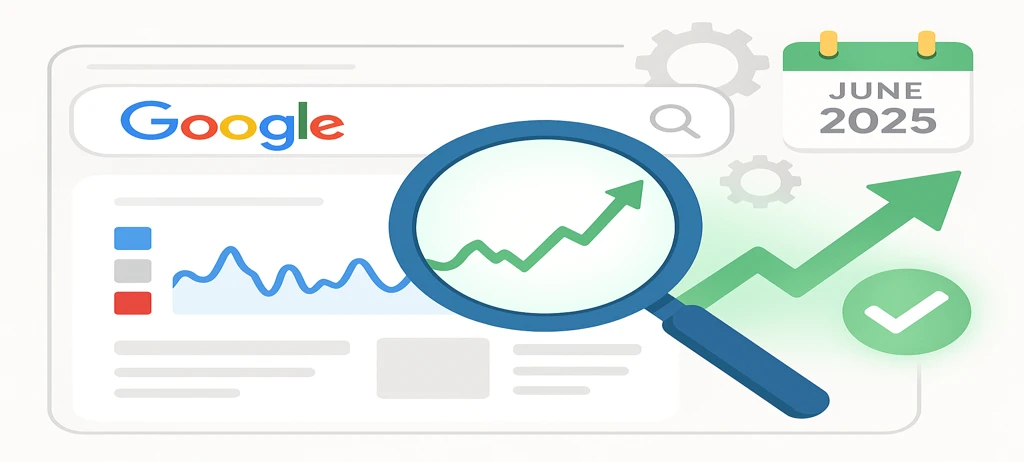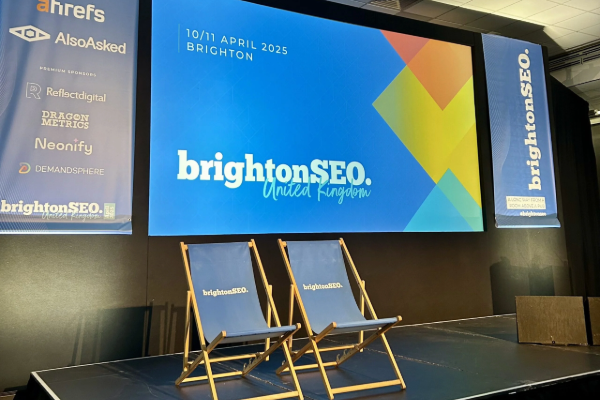
Our SEO expert, Emilie Amaral, shares the latest news and updates across SEO.
Google Rolls out June 2025 Core Update
The June 2025 Google Core Update is a major revision to Google’s search ranking algorithm aimed at improving the quality and relevance of search results. It began rolling out on 30 June 2025 and is expected to take two to three weeks to complete. During this time, site owners and businesses are advised to avoid making immediate changes in response to ranking fluctuations and instead focus on monitoring key performance indicators such as search traffic, keyword rankings, and user engagement. Tracking these metrics throughout the rollout will help identify the update’s impact and guide informed optimisation once it has stabilised.
Why we care: Core updates can be critical because they can significantly impact a website’s visibility in search results both positively and negatively, affecting traffic and business performance. Understanding that ranking fluctuations are a normal part of the process helps to avoid making rushed decisions before the updates are finished while focusing on SEO best practice, long-term improvements, and strategy.
Google adds loyalty programs support to organization structured data
Google has introduced support for loyalty program structured data within Organization and Product markup, enabling businesses to prominently display member benefits such as loyalty points, exclusive pricing, and special shipping directly in search results. This update offers a valuable opportunity for companies, especially those without Merchant Center accounts, to enhance their visibility and attract loyal customers. Google advises placing all loyalty information on a dedicated page to make sure crawling is efficient and effective and also recommends using the Rich Results Test tool to validate proper implementation.
Why we care: Companies offering membership or loyalty pricing, implementing this new supported markup could boost click-through rates from Google Search and help increase membership and loyalty scheme enrolments.
Google Tests ‘Preferred Sources’ To Personalize Top Stories In Search
Google is currently experimenting with a feature called “Preferred Sources” within the Top Stories section, accessible through Search Labs in the United States and India. This feature lets users personalise their news experience by selecting specific publishers they wish to prioritise. By clicking a star icon beside the Top Stories header, users can highlight preferred sources, which will then appear more frequently in their news feed, and will be marked with a star. Additionally, these selected sources may be showcased in a separate “From your sources” carousel. This initiative aims to offer users greater control over the news they consume and, if widely adopted, could significantly influence how publishers connect with their audiences via Google Search.
Why we care: This change could boost visibility for businesses with loyal customers but may disadvantage smaller or newer brands, emphasising the growing importance of brand recognition and direct audience engagement. This is where creating informational or blog-style content helps to not only build brand expertise but also rank higher for instance, in AI Overviews and build a loyal customer that trusts the brand.
Google’s New MUVERA Algorithm Improves Search
Google has announced a new algorithm called MUVERA, which stands for Multi-Vector Retrieval Algorithm. MUVERA improves the search experience by combining multiple ways of analysing and understanding content into a single, efficient system. This innovation allows Google to deliver faster and more accurate search results while using less computational power. Beyond traditional search, MUVERA also enhances recommendation systems and other language-related applications. For businesses, this development emphasises the increasing importance of focusing on user intent and producing content that thoroughly covers topics in a meaningful way, rather than relying solely on exact keyword matches.
Why we care: MUVERA highlights that search rankings rely more on understanding the overall intent and context of queries rather than exact keyword matches, encouraging businesses to focus on genuinely relevant content. This can be done by publishing blog-style articles that showcase the brand’s expertise and knowledge. This, in turn, not only helps ranking in the algorithm and appearing in AI overviews but also boosts site authority and showcases expertise to clients.
Author: Emilie Amaral
Published: 21st July 2025























